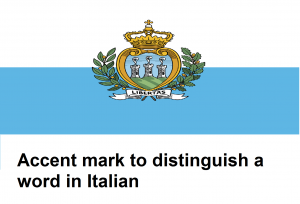Difference between revisions of "Language/Italian/Grammar/Accent-mark-to-distinguish-a-word"
(Accent mark to distinguish a word in Italian) |
(Accent mark to distinguish a word in Italian) |
||
| Line 9: | Line 9: | ||
Good learning ! :) | Good learning ! :) | ||
. | |||
. | |||
. | |||
. | |||
. | |||
. | |||
. | . | ||
| Line 15: | Line 27: | ||
== '''Some words for Accent mark to distinguish a word in Italian''' == | == '''Some words for Accent mark to distinguish a word in Italian''' == | ||
{| class="wikitable | {| class="wikitable" | ||
!<big>'''ENGLISH'''</big> | !<big>'''ENGLISH'''</big> | ||
!<big>'''PRONUNCIATION'''</big> | !<big>'''PRONUNCIATION'''</big> | ||
| Line 33: | Line 44: | ||
| | | | ||
| | | | ||
|- | |- | ||
|''' | |Preposition | ||
| | |''dah'' | ||
| | |'''<big>DA</big>''' | ||
| | |''dá'' | ||
| | |Preposição | ||
| | |- | ||
|Third person of the verb to give | |||
|''dah'' | |||
|'''<big>DÀ</big>''' | |||
|''dá'' | |||
|Terceira pessoa do verbo dar | |||
|- | |||
|Noun | |||
|''dih'' | |||
|'''<big>DÌ</big>''' | |||
|''dí'' | |||
|Substantivo | |||
|- | |||
|Preposition | |||
|''dih'' | |||
|<big>'''Dİ'''</big> | |||
|''dí'' | |||
|Preposição | |||
|- | |||
|Conjuction | |||
|''eh'' | |||
|'''<big>E</big>''' | |||
|''e'' | |||
|Conjunção | |||
|- | |||
|Third person of the verb to be | |||
|''eh'' | |||
|'''<big>È</big>''' | |||
|''é'' | |||
|Terceira pessoa do verbo ser | |||
|- | |||
|Pronoun | |||
|''lih'' | |||
|<big>'''Lİ'''</big> | |||
|''lí'' | |||
|Pronome | |||
|- | |||
|Adverb | |||
|''lih'' | |||
|'''<big>LÌ</big>''' | |||
|''lí'' | |||
|Advérbio | |||
|- | |||
|Pronoun | |||
|''lah'' | |||
|'''<big>LA</big>''' | |||
|''la'' | |||
|Pronome | |||
|- | |||
|Adverb | |||
|''lah'' | |||
|'''<big>LÀ</big>''' | |||
|''la'' | |||
|Advérbio | |||
|- | |||
|Conjuction | |||
|''seh'' | |||
|'''<big>SÉ</big>''' | |||
|''se'' | |||
|Conjunção | |||
|- | |||
|Pronoun | |||
|''seh'' | |||
|'''<big>SE</big>''' | |||
|''se'' | |||
|Pronome | |||
|- | |||
|Conjuction | |||
|''neh'' | |||
|'''<big>NÉ</big>''' | |||
|''ne'' | |||
|Conjunção | |||
|- | |||
|Pronoun or adverb | |||
|''neh'' | |||
|'''<big>NE</big>''' | |||
|''ne'' | |||
|Pronome ou advérbio | |||
|- | |||
|Noun of the plant and | |||
the infusion | |||
|''teh'' | |||
|'''<big>TÈ</big>''' | |||
|''té'' | |||
|Substantivo da planta e | |||
infusão | |||
|- | |- | ||
|''' | |Pronoun | ||
| | |''teh'' | ||
| | |'''<big>TE</big>''' | ||
|''te'' | |||
|Pronome | |||
|} | |} | ||
. | |||
I want to give you a list of monosyllables which have a different meaning when they are unaccented or accented. | I want to give you a list of monosyllables which have a different meaning when they are unaccented or accented. | ||
# '''da''' (preposition) ♣ '''dà''' (third person of the verb to give) | # '''da''' (preposition) ♣ '''dà''' (third person of the verb to give) | ||
Revision as of 23:29, 2 May 2020
.
Hello everybody,
In today's lesson you will learn some useful vocabulary about ¨USEFUL VERBS¨ in Italian
Feel free to edit this page by adding new words and expressions !
Good learning ! :)
.
.
.
.
.
.
.
.
Some words for Accent mark to distinguish a word in Italian
| ENGLISH | PRONUNCIATION
ENGLISH |
ITALIAN | PRONUNCIATION
BRAZILIAN PORTUGUESE |
BRAZILIAN
PORTUGUESE |
|---|---|---|---|---|
| Preposition | dah | DA | dá | Preposição |
| Third person of the verb to give | dah | DÀ | dá | Terceira pessoa do verbo dar |
| Noun | dih | DÌ | dí | Substantivo |
| Preposition | dih | Dİ | dí | Preposição |
| Conjuction | eh | E | e | Conjunção |
| Third person of the verb to be | eh | È | é | Terceira pessoa do verbo ser |
| Pronoun | lih | Lİ | lí | Pronome |
| Adverb | lih | LÌ | lí | Advérbio |
| Pronoun | lah | LA | la | Pronome |
| Adverb | lah | LÀ | la | Advérbio |
| Conjuction | seh | SÉ | se | Conjunção |
| Pronoun | seh | SE | se | Pronome |
| Conjuction | neh | NÉ | ne | Conjunção |
| Pronoun or adverb | neh | NE | ne | Pronome ou advérbio |
| Noun of the plant and
the infusion |
teh | TÈ | té | Substantivo da planta e
infusão |
| Pronoun | teh | TE | te | Pronome |
. I want to give you a list of monosyllables which have a different meaning when they are unaccented or accented.
- da (preposition) ♣ dà (third person of the verb to give)
- dì (noun) ♣ di (preposition)
- e (conjunction) ♣ è (third person of the verb to be)
- li (pronoun) ♣ lì (adverb)
- la (pronoun) ♣ là (adverb)
- sé (conjunction) ♣ se (pronoun)
- sì (adverb) ♣ si (pronoun)
- né (conjunction) ♣ ne (pronoun or adverb)
- tè (noun of the plant and the infusion) ♣ te (pronoun)
Here are some examples: ☺
- Il dottore viene da Milano ♣ La nonna dà una caramella al bambino
The doctor comes from Milan ♣ The grandmother gives the child a candy
- Ho studiato tutto il dì ♣ Ho un braccialetto di rame.
I studied all day ♣ I have a copper bracelet.
- Mario e Luca sono amici ♣ Il pilota è attento
Mario and Luca are friends ♣ The pilot is careful
- Li conosco da poco ♣ Vado lì fuori.
I know them recently ♣ I go out there.
- La mamma è a lavoro ♣ Posalo là, vicino la scrivania
Mom is at work ♣ Put it there, near the desk
- Portò la borsa con sè ♣ Se tu fossi al mio posto
He carried the bag with him ♣ If you were in my place
- Sì, sono qui ♣ Si guardò allo specchio
Yes, I'm here ♣ He looked in the mirror
- Non funzionano né questo né quello ♣ Ne ho ricevuto una parte
Neither this nor that work ♣ I received a part of it
- Vuoi una tazza di tè? ♣ Vengo da te alle cinque
Do you want a cup of tea? ♣ I come to you at five

